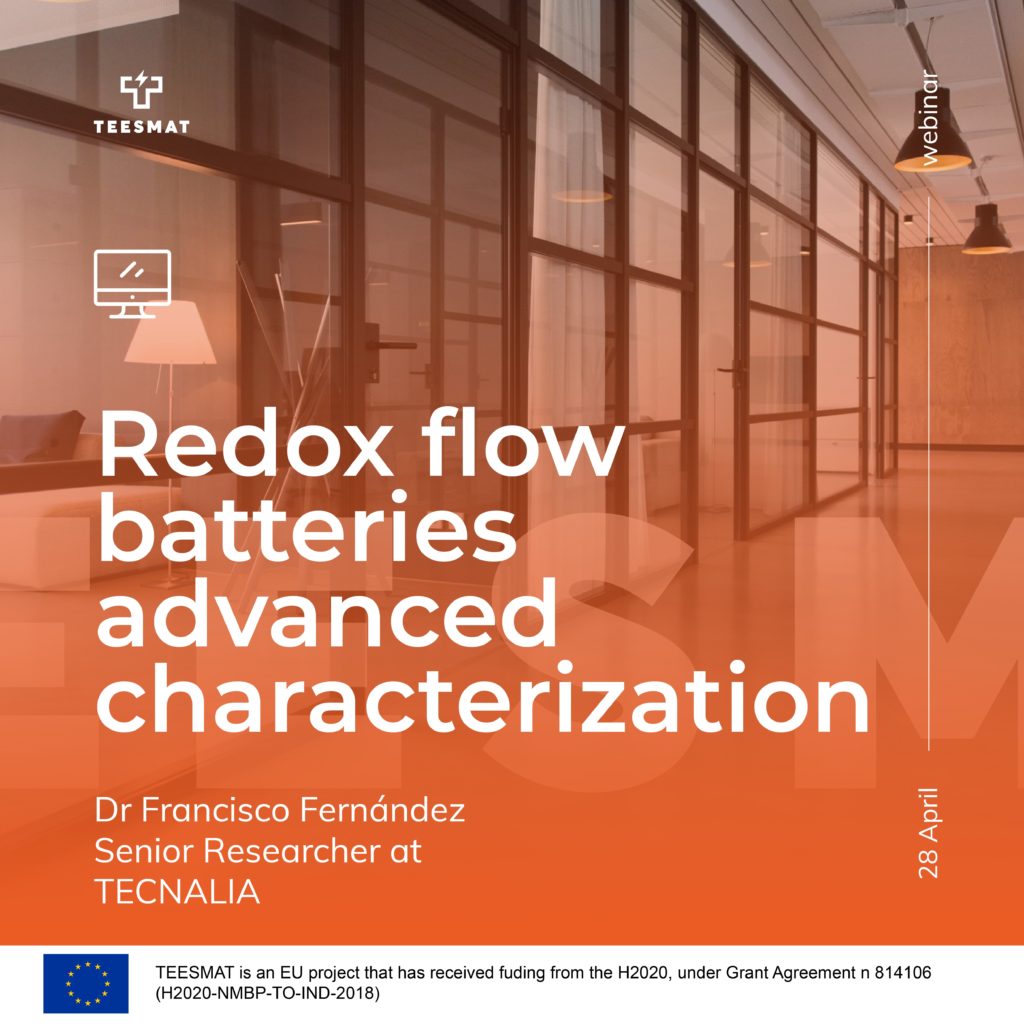Webinar - Redox flow batteries advanced characterization
TEESMAT WEBINAR SERIES

28 APRIL 2022, 15:00-16:00 CET
Join the conversation! Register to our webinar for free!
TEESMAT project organises a series of webinars with the Service Providers presenting the characterization techniques and user cases.
The seventh webinar, titled ‘Redox flow batteries advanced characterization‘, will be presented by the expert Francisco J. Fernández-Carretero from TECNALIA.
The topic
Redox Flow Batteries, based on their particular ability to decouple power and energy, stand as prime candidates for cost-effective stationary storage, particularly in the case of long discharges and long storage times. They represent a potential grid-scale energy storage technology. A deep understanding of the process that occurs inside the battery while cycling it is paramount importance and it is approached in the TEESMAT project.
One of the characteristics that differentiates flow batteries is the fact that the electrolyte is in motion. This makes operating variables such as flow, channel design, electrode compression, etc. critical in optimizing battery performance. The effect of these variables can be studied in-operando by studying the current distribution (T5). This method is also applied to metal-air batteries within the frame of TEESMAT project.
An advantage of flow batteries is the elevated battery cycle-life that makes it necessary to develop accelerated aging methods to predict the evolution of materials in a short period of time. TEESMAT has developed an accelerated aging method for electrodes (T20).
The webinar will provide an overview of the characterization techniques available for Redox Flow Batteries, focussing on that are present in the TEESMAT project (T5, current distribution and T20, accelerated degradation of electrodes).
T5 Current distribution in redox flow batteries and metal-air batteries:
The Operando electrochemical assessment of electrodes consist on an experimental set-up to study the electrochemical performance of Redox Flow Batteries and Metal-Air Batteries in operando conditions. The effect of the operating conditions on the current density obtained and therefore, its effect on the battery materials can be elucidated. The use of a segmented cell enables in operando visualization of the current distribution. With this technique the individual components of the batteries (membrane, electrodes and bipolar plates mainly) can be characterized. Additionally, different flow plates (serpentine, parallel, etc.) can be adapted to the segmented cell. Localized real-time knowledge of performance in the cells enables insight optimization of cell architecture, materials, operation protocols or other aspects that can further extend longevity and enhance performance of the batteries.
T20 Accelerated degradation tests:
The objective of the Accelerated degradation cell test is to set up an experimental procedure to perform accelerated aging of Redox Flow Batteries materials in a reliable way. In this sense, the cell-in-series method proposed in the latest years by the Mench group (A. M. Pezeshki, R. L. Sacci, G. M. Veith, T. A. Zawodzinski, and M. M. Mench, Journal of The Electrochemical Society, 163(1), A5202 (2016)) consists in maintaining a constant SoC in the battery by using two cells in series. It allows to achieve extreme conditions on the testing cell, i.e. charging at high SoC and discharging while at low SoC by using potentiostatic control on the testing cell and galvanostatic control on the counter-cell. By using this methodology, it is possible to accelerate up to seven times the degradation of battery materials, especially the electrodes, compared with a conventional long-term cycling experiment. The combination of the cell-in-series with the segmented cell described in the T5: Operando electrochemical assessment of electrodes will allow a more detailed study of the degradation of the materials of the redox flow batteries. It is possible to simulate areas with high flows and dead zones by studying how this has an effect in an accelerated degradation test. In this way it is possible to obtain a detailed model of the degradation of the battery and how it affects the current distribution.
In parallel, TECNALIA is also validating a protocol including several techniques for the characterization of ion conducting membranes for redox flow batteries, a critical component in this battery technology.
The speaker
Dr. Francisco J. Fernández-Carretero has a PhD in Chemical Engineering from the Polytechnic University of Valencia. Since 2008 he works as a Senior Researcher at Tecnalia in the Materials and Processes Area. His research is focused on the development of materials for energy storage applications. Among its main lines of research are fuel cells, redox flow batteries and post-lithium batteries (lithium-sulfur, metal-air and thin-film batteries). He has participated in more than 20 EU and national research projects related to energy storage and is the author of 15 publications in peer-reviewed scientific journals.
Practical information
Date & Time: 28 April 2022, 15:00-16:00 CET
Location: Online
Registration: Participation is open to all interested parties, please register on this page.
_______________________
About TEESMAT
Energy is one of the keystones of prosperity in the European Union. Access to advanced characterisation solutions enables industry to apply a knowledge-based approach, which is essential to accelerate innovation and reduce the cost of technologies.
Battery energy storage plays a major role in the ongoing transition to a decarbonised and clean energy system. The development of a competitive battery value chain in Europe is one of the top priorities of the European Commission.
TEESMAT – the Open Innovation Test Bed for Electrochemical Energy Storage Materials – brings a comprehensive response to the critical bottlenecks faced by EU stakeholders in the field of electrochemical energy storage materials. It leverages EU know-how & expertise from 11 countries and facilitates access to physical facilities, usable data, and industrially relevant services based on novel characterisation solutions.
The main impact of TEESMAT lays in setting up & implementing a financially sustainable Open Innovation Test Bed whose techniques and services address diverse problems faced in the development of clean, safe, high-performance battery solution.
Be part of TEESMAT community. W: www.teesmat.eu | T: @Teesmat_EU | In : TEESMAT
TEESMAT is an EU project that has received funding from the H2020, under Grant Agreement n 814106 (H2020-NMBP-TO-IND-2018).
